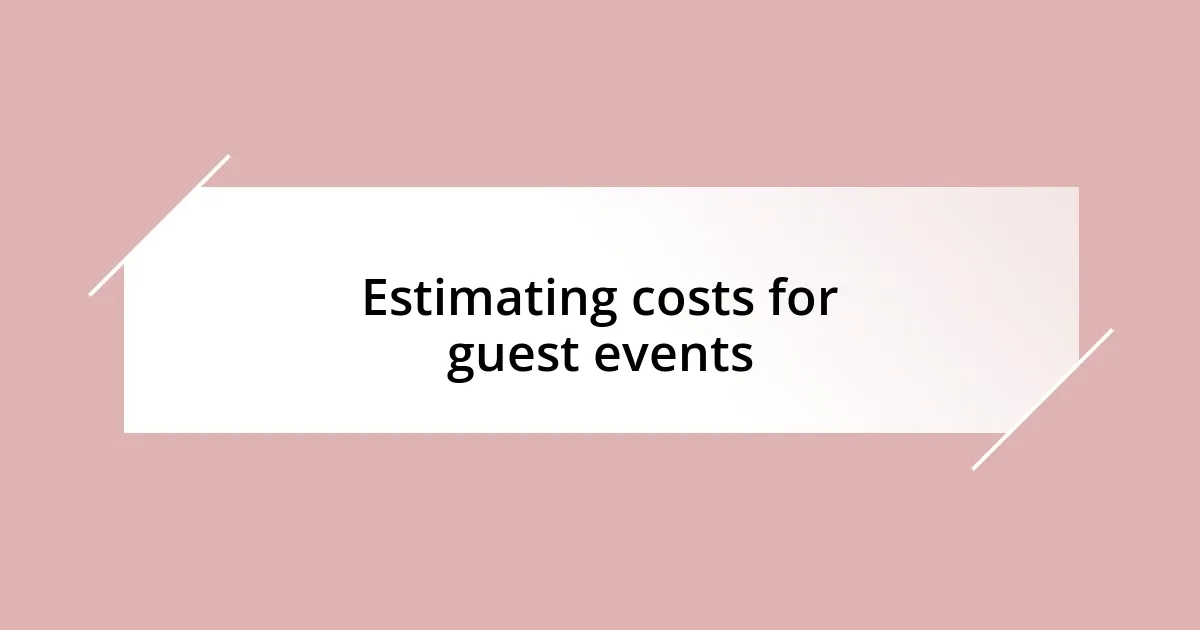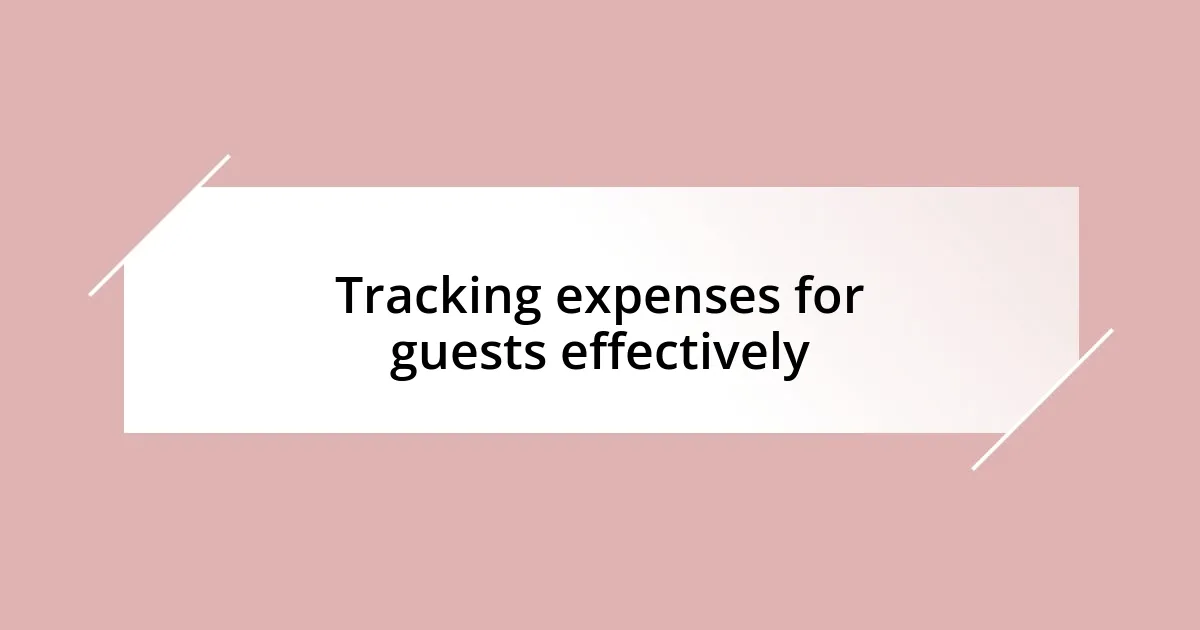Key takeaways:
- Setting a clear budget and anticipating all potential expenses helps manage costs and prioritize spending.
- Identifying guest spending categories such as food, decorations, and venue costs allows for better planning and expectation management.
- Being flexible with the budget by allowing a cushion for unexpected expenses enhances the overall experience and reduces stress.
- Effective expense tracking using apps or spreadsheets ensures adherence to the budget and aids in making informed adjustments as necessary.

Understanding guest budgeting basics
When it comes to guest budgeting, the basics often revolve around understanding how much you’re willing to invest in creating lasting memories. I remember the first time I tried hosting a gathering on a budget. I felt overwhelmed, as I wanted to celebrate but didn’t want to break the bank. It made me realize that setting a clear budget is essential; it not only keeps costs manageable but also helps prioritize where to splurge and where to cut back.
A crucial aspect of guest budgeting is anticipating expenses. Think about everything from food and drinks to decor and entertainment. I once overlooked the little things, like party favors and tableware, and was surprised at how quickly costs added up. Have you ever found yourself in a similar predicament? By listing all potential expenses upfront, you can paint a clearer picture of your financial roadmap.
Finally, it’s important to be flexible with your budget. I often find that unexpected costs pop up, which can be stressful. But I’ve learned to embrace adjustments; I can pivot and decide which areas matter most. After all, it’s not about perfection but about creating an enjoyable experience for both you and your guests.

Identifying guest spending categories
Identifying guest spending categories is a vital step in planning any gathering. It’s fascinating how breaking down expenses helps manage expectations and prevents last-minute shocks. In my experience, devoting time to categorize what guests might spend allows for clearer planning and less anxiety.
Here are some common guest spending categories to consider:
- Food and Drinks: This often takes the largest chunk of your budget. I learned the hard way that opting for a potluck can lighten the load while adding variety to the table.
- Decorations: I remember spending hours making DIY decorations, which added a personal touch without the hefty price tag.
- Entertainment: From games to playlists, this can greatly influence how memorable your gathering will be.
- Favors: Personal touches can go a long way. I once made homemade treats as gifts, and my guests appreciated the thoughtfulness.
- Venue Costs: If you’re hosting outside your home, it’s essential to consider location fees, which can add up quickly.
Taking the time to define these categories helped me feel more in control of my budget and ultimately led to enjoyable experiences without the stress of overspending.

Estimating costs for guest events
Estimating costs for guest events can be a thoughtful process, but it’s essential to start with a realistic mindset about your financial resources. When I first tried calculating my expenses for a birthday party, I actually went overboard on the initial estimates. I remember feeling that rush of excitement while browsing through catering menus, but the reality hit me after I calculated everything. To avoid such surprises, I now rely on a simple spreadsheet to estimate costs. It’s helped me become meticulous about recording every item, from the food all the way to the last candle.
Another strategy I discovered is to compare quotes from different vendors. When I was planning a summer BBQ, I reached out to various caterers, and the price differences were eye-opening. This experience taught me not only to seek the best deals but also to negotiate prices. Don’t be afraid to ask for discounts or inquire about package deals. In my experience, a little conversation can lead to significant savings.
Lastly, I actively budget for contingencies. Events are rarely perfect, and I’ve encountered situations where I needed to add extra chairs, or the weather forced a venue change. Setting aside about 10% of my total budget for unexpected costs has become second nature for me. It brings a sense of security and allows me to enjoy the process instead of worrying about the unknown.
| Cost Category | Estimated Range |
|---|---|
| Food and Drinks | $15 – $50 per person |
| Decorations | $30 – $200 |
| Entertainment | $50 – $300 |
| Favors | $1 – $10 each |
| Venue Costs | $100 – $500 |

Creating a flexible guest budget
Creating a flexible guest budget is truly an art form. I learned early on that rigidity in budgeting could lead to unnecessary stress. During one memorable gathering, I budgeted strictly and refused to budge when unexpected expenses popped up. It hit me hard when I had to sacrifice party activities to stick to my financial limits. Now, I allow some wiggle room within my budget to accommodate those surprises.
I often set a baseline budget, but I also allocate a certain percentage—like 15%—as a cushion for spontaneous decisions. For instance, during a last-minute planning session for a friend’s surprise party, I realized that an entertaining magician could elevate the atmosphere significantly. I was grateful I had that extra cushion available because those moments can truly make a gathering unforgettable.
Another tactic that has worked wonders for me is checking in with guests about their preferences. Once, while planning a casual get-together, I casually asked friends what they’d enjoy. This not only strengthened my relationship with them but also gave me valuable insights into what might be worth spending a bit more on, making me feel more confident and prepared. So, have you thought about how your guests’ desires can shape your budget? Flexibility combined with their input can not only enhance the gathering but also enrich your budgeting experience.

Tracking expenses for guests effectively
Tracking expenses effectively can make or break your event. I learned this firsthand when I neglected to monitor costs during a recent dinner party. I had all my receipts piled up, but when it came time to settle everything, the total surprised me—well beyond what I had expected. Now, I make it a point to enter every expense into an app right after I incur it. This way, I can see in real-time how much I’ve spent and adjust my planning if needed. Have you ever felt that rush of panic when the numbers don’t add up?
Another useful method is categorizing expenses as they come in. The first time I tried this was during a holiday gathering. I created categories for food, decorations, and entertainment. Seeing where my money was going not only helped me avoid overspending in one area but also allowed me to shift funds between categories when something piqued my interest, like that stunning centerpiece I just couldn’t resist. It made me feel more in control, knowing I could make adjustments on the fly without feeling guilty.
I also recommend keeping a running total and reviewing this regularly. For example, as I prepared for a family reunion, I scheduled weekly check-ins where I’d reassess my budget and compare it against my planned expenses. It’s such a simple step, but it alleviated a lot of stress as I got closer to the date. It’s almost like a puzzle; fitting all the pieces together gives me a sense of accomplishment. Are you tracking your expenses in a way that helps you feel secure? If not, it might be time to streamline your approach!














